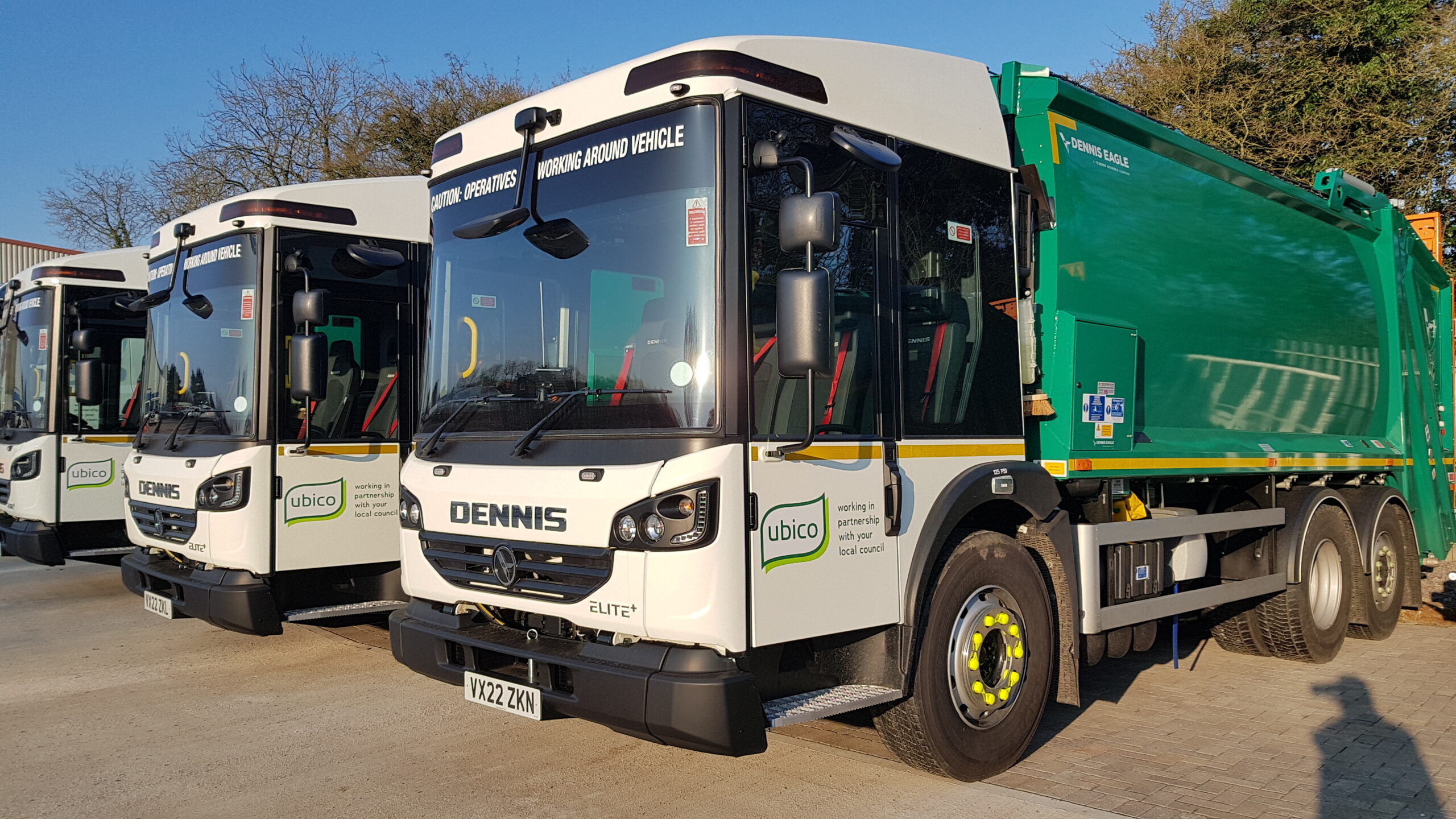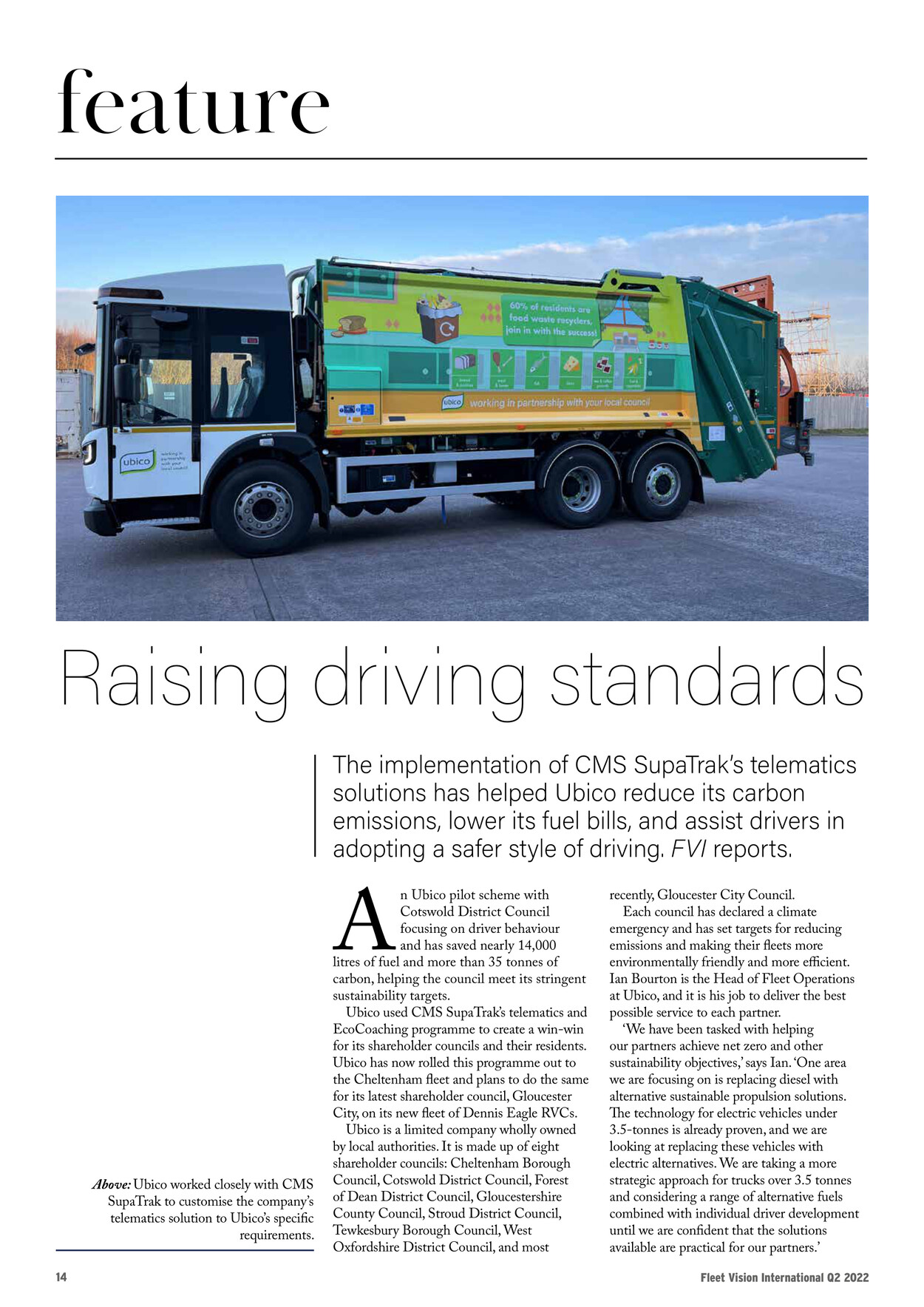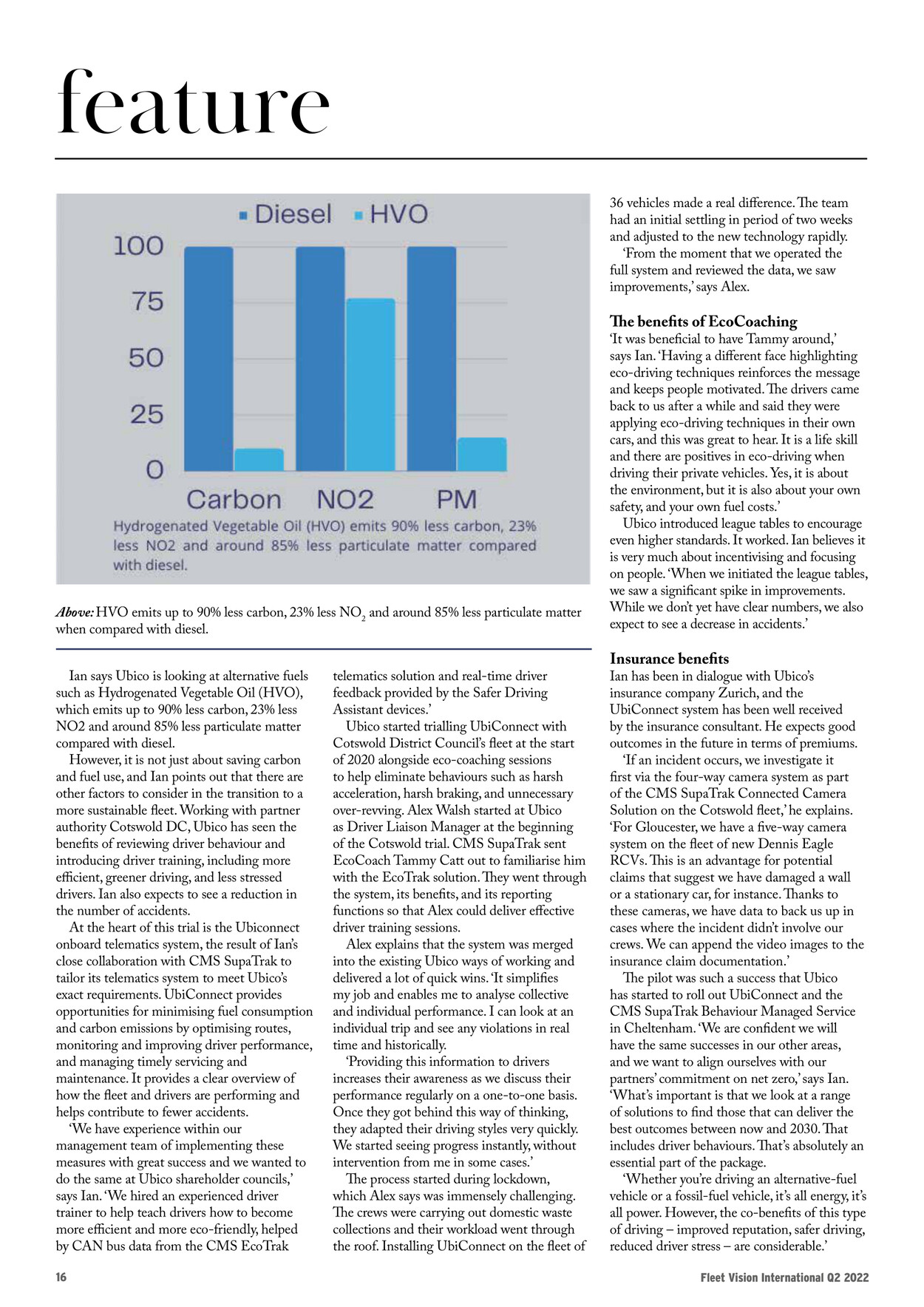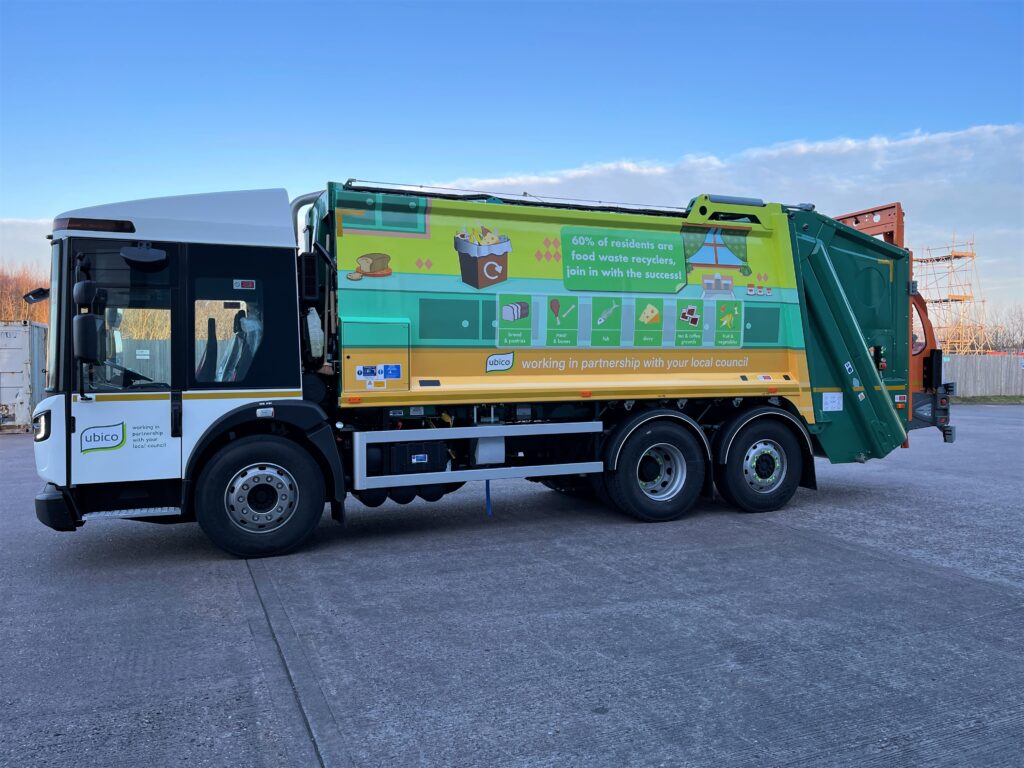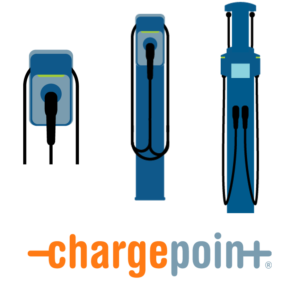The implementation of CMS SupaTrak’s telematics solutions has helped Ubico reduce its carbon emissions, lower its fuel bills, and assist drivers in adopting a safer style of driving.
An Ubico pilot scheme with Cotswold District Council focusing on driver behaviour and safety has saved nearly 14,000 litres of fuel and more than 35 tonnes of carbon, helping the council meet its stringent sustainability targets.
Ubico used CMS SupaTrak’s telematics and EcoCoaching programme to create a win-win for its shareholder councils and residents. Ubico has now rolled this programme out to the Cheltenham fleet and plans to do the same for its latest shareholder council, Gloucester City, on its new fleet of Dennis Eagle RVCs.
Ubico is a limited company wholly owned by local authorities. It is made up of eight shareholder councils: Cheltenham Borough Council, Cotswold District Council, Forest of Dean District Council, Gloucestershire County Council, Stroud District Council, Tewkesbury Borough Council, West Oxfordshire District Council, and most recently, Gloucester City Council.
Adressing the climate emergency
Each council has declared a climate emergency and has set targets for reducing emissions and making their fleets more environmentally friendly and more efficient. Ian Bourton is the Head of Fleet Operations at Ubico, and it is his job to deliver the best possible service to each partner.
‘We have been tasked with helping our partners achieve net-zero and other sustainability objectives,’ says Ian. ‘One area we are focusing on is replacing diesel with alternative sustainable propulsion solutions. The technology for electric vehicles under 3.5-tonnes is already proven, and we are looking at replacing these vehicles with electric alternatives. We are taking a more strategic approach for trucks over 3.5 tonnes and considering a range of alternative fuels combined with individual driver development until we are confident that our partners’ solutions are practical.
HVO
Ian says Ubico is looking at alternative fuels such as Hydrogenated Vegetable Oil (HVO), which emits up to 90% less carbon, 23% less NO2 and around 85% less particulate matter compared with diesel.
However, it is not just about saving carbon and fuel use, and Ian points out that there are other factors to consider in the transition to a more sustainable fleet. Working with partner authority Cotswold DC, Ubico has seen the benefits of reviewing driver behaviour and introducing driver training, including more efficient, greener driving, and less stressed drivers. Ian also expects to see a reduction in the number of accidents.
Ubiconnect telematics system
At the heart of this trial is the Ubiconnect onboard telematics system, the result of Ian’s close collaboration with CMS SupaTrak to tailor its telematics system to meet Ubico’s exact requirements. UbiConnect provides opportunities for minimising fuel consumption and carbon emissions by optimising routes, monitoring and improving driver performance, and managing timely servicing and maintenance. It provides a clear overview of how the fleet and drivers are performing and helps contribute to fewer accidents.
Success story
‘We have experience within our management team of implementing these measures with great success, and we wanted to do the same at Ubico shareholder councils,’ says Ian. ‘We hired an experienced driver trainer to help teach drivers how to become more efficient and more eco-friendly, helped by CANbus data from the CMS EcoTrak telematics solution and real-time driver feedback provided by the Safer Driving Assistant devices.’
Eco-coaching
Ubico started trialling UbiConnect with Cotswold District Council’s fleet at the start of 2020 alongside eco-coaching sessions to help eliminate behaviours such as harsh acceleration, harsh braking, and unnecessary over-revving. Alex Walsh started at Ubico as Driver Liaison Manager at the beginning of the Cotswold trial. CMS SupaTrak sent EcoCoach Tammy Catt out to familiarise him with the EcoTrak solution. They went through the system, its benefits, and its reporting functions so that Alex could deliver effective driver training sessions.
Quick wins
Alex explains that the system was merged into the existing Ubico ways of working and delivered a lot of quick wins. ‘It simplifies my job and enables me to analyse collective and individual performance. I can look at an individual trip and see any violations in real-time and historically.
‘Providing this information to drivers increases their awareness as we discuss their performance regularly on a one-to-one basis. Once they got behind this way of thinking, they adapted their driving styles very quickly. We started seeing progress instantly, without intervention from me in some cases.’
The process started during the lockdown, which Alex says was immensely challenging. The crews were carrying out domestic waste collections, and their workload went through the roof. Installing UbiConnect on the fleet of 36 vehicles made a real difference. The team had an initial settling in period of two weeks and adjusted to the new technology rapidly.
‘From the moment that we operated the full system and reviewed the data, we saw improvements,’ says Alex.
The benefits of coaching
‘It was beneficial to have Tammy around,’ says Ian. ‘Having a different face highlighting eco-driving techniques reinforces the message and keeps people motivated. After a while, the drivers came back to us and said they were applying eco-driving techniques in their own cars, which was great to hear. It is a life skill, and there are positives in eco-driving when driving their private vehicles. Yes, it is about the environment, but it is also about your own safety and your own fuel costs.’
Ubico introduced league tables to encourage even higher standards. It worked. Ian believes it is very much about incentivising and focusing on people. ‘When we initiated the league tables, we saw a significant spike in improvements. While we don’t yet have clear numbers, we also expect to see a decrease in accidents.’
Insurance benefits
Ian has been in dialogue with Ubico’s insurance company Zurich, and the UConnect system has been well received by the insurance consultant. He expects good outcomes in the future in terms of premiums.
‘If an incident occurs, we investigate it first via the four-way camera system as part of the CMS SupaTrak Connected Camera Solution on the Cotswold fleet,’ he explains. ‘For Gloucester, we have a five-way camera system on the fleet of new Dennis Eagle RCVs. This is an advantage for potential claims that suggest we have damaged a wall or a stationary car, for instance. Thanks to these cameras, we have data to back us up in cases where the incident didn’t involve our crews. We can append the video images to the insurance claim documentation.’
Roll out
The pilot was so successful that Ubico has started to roll out UbiConnect and the CMS SupaTrak Behaviour Managed Service in Cheltenham. ‘We are confident we will have the same successes in our other areas, and we want to align ourselves with our partners’ commitment on net-zero,’ says Ian. ‘What’s important is that we look at a range of solutions to find those that can deliver the best outcomes between now and 2030. That includes driver behaviour, which is an essential part of the package.
‘Whether you’re driving an alternative-fuel vehicle or a fossil-fuel vehicle, it’s all energy, and it’s all power. However, the co-benefits of this type of driving – improved reputation, safer driving, reduced driver stress – are considerable.’
